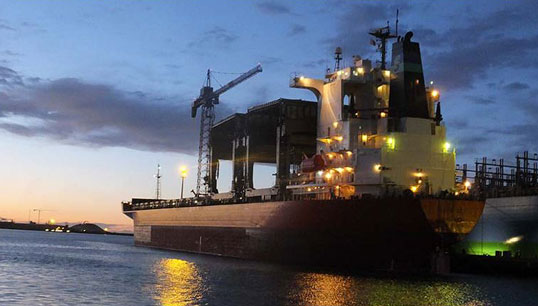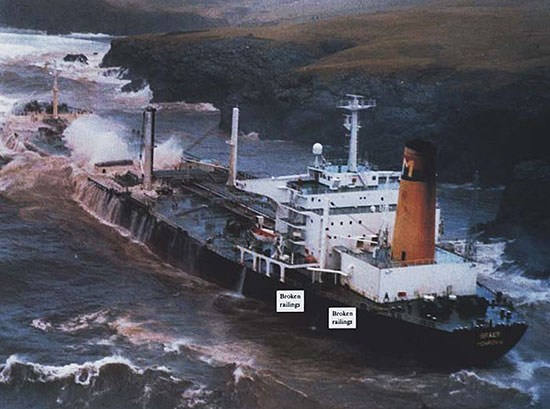- Topics
- Campaigning
- Careers
- Colleges
- Community
- Education and training
- Environment
- Equality
- Federation
- General secretary message
- Government
- Health and safety
- History
- Industrial
- International
- Law
- Members at work
- Nautilus news
- Nautilus partnerships
- Netherlands
- Open days
- Opinion
- Organising
- Podcasts from Nautilus
- Sponsored content
- Switzerland
- Technology
- Ukraine
- United Kingdom
- Welfare

A new report into shipping safety risks in UK waters highlights the 'extreme paucity' of emergency cover in several key areas
Nautilus has urged the British government to put safety before cost when considering emergency towing coverage following a new report into shipping safety risks in UK waters, which highlighted the 'extreme paucity' of emergency cover in several key areas.
Nautilus professional and technical officer David Appleton said: 'The increasing size and complexity of ships and their cargoes, as well as the growing frequency of adverse weather conditions around the UK coast, underlines the importance of the protection that they provide.
'Not only would the cost of a big spill be many times more than that of providing adequate emergency towing vessel (ETV) cover, there are many other benefits that could flow from their provision – including training, hydrographic surveys, and security,' he added.
'We hope that the Maritime and Coastguard Agency (MCA) and the government have the good sense to look below the bottom line and to consider the wider benefits that could be gained from the deployment of ETVs in our waters.'
The independent report was produced for the MCA in response to a Marine Accident Investigation Branch (MAIB) report on a collision in the Channel in 2016 which recommended a reassessment of the need for a dedicated emergency towing capability in the Dover Strait.
Spending cuts
Four ETVs were first deployed around the UK following Lord Donaldson's report on the Braer tanker disaster in 1993, but their numbers were reduced as a result of government spending cuts and only one – in the north of Scotland – remained in service after 2011.
The MAIB investigation into the collision between the general cargoship Saga Sky and a rock-carrying barge off the coast of Kent found that attempts to locate a tug capable of providing assistance to the ship as it drifted towards the unmanned barge in the 90 minutes leading up to the accident had proved unsuccessful.
The French ETV Abeille Languedoc was sent to the scene, but with a 30-minute mobilisation period and a two-hour transit time, MAIB said the collision occurred 'well before' it could have been able to intervene.
The MCA's contract for the one remaining ETV – the Italian-flagged Levoli Black – is due to finish at the end of 2021 and the new report is being used by the MCA as part of its consideration of future ETV provision.
The study, carried out by the Frazer-Nash Consultancy, is the first since 2008 to assess the shipping risks within the UK's Exclusive Economic Zone (EEZ) and notes that while ETVs may not always be able to prevent an incident from occurring, risk assessments demonstrate that their presence does mitigate some of the risks.
The report warns that assumptions that 'market forces' would fill the gap in tug cover following the withdrawal of ETVs in 2011 have not proved correct. 'There is evidence that the commercial towage market has not responded in the way it was originally envisaged, while the UK maritime environment has increased in complexity over the same period,' it adds.
Not only would the cost of a big spill be many times more than that of providing adequate emergency towing vessel (ETV) cover, there are many other benefits that could flow from their provision – including training, hydrographic surveys, and security
High risk areas
The review is based upon detailed analysis of seven high-risk areas, including the Pentland Firth, Fair Isle Channel, Dover Strait and its approaches, South West Approaches, St George's Channel, The North Channel and The Minches.
Experts developed risk assessments based on AIS data showing shipping movements and traffic density, as well as factors such as volumes of bunker and cargo oil being carried, trends in shipping growth, natural and artificial offshore hazards, and the intercept times of available tugs.
The study also looks at the risk of incidents occurring, their possible impact on the marine environment and local marine economies, as well as the potential costs of an oil spill, and makes a cost-benefit analysis of emergency towage options.
'The risk assessment shows that highest risk areas identified are those in the South of England, namely Dover Strait and South West Approaches. As expected, this corresponds to the high levels of shipping traffic in these areas. The lowest risk areas for ship disablement are St George's Channel and the North Channel, both of which are assessed as low risk.'
There are signs that shipping safety and reliability has improved significantly with no major tanker accidents in UK waters since the Braer and Sea Empress disasters in the 1990s.

This picture from the 2015 MAIB report shows the Braer aground with broken rails port side aft in way of air pipes. Image: MAIB
'The only scenario that could justify the provision of ETVs is to mitigate against large tanker spills, which is an infrequent occurrence. As with all low probability/high impact risk scenarios, there is an argument that preventative measures are preferable to post incident recovery.
'Whilst historically the presence of an ETV could be justified, the nature of shipping has changed since 1994 and as a result the risks have reduced owing to changes in technology, design, operation and safety awareness of shipping.'
However, the report also notes that 'economic pressures and reduced crew complements have increased the risk of fatigue and human error, and spatial and environmental factors mean that there are competing pressures on the use of the sea areas around the coast of the UK'.
It concludes, 'due to our dependency on the sea as an island nation, cost might not be the only aspect to be considered when making decisions around ETV provisions with benefit to local economies and safety of life at sea aspects also playing an important role'.
World heritage site
An analysis of the availability of vessels around the UK coast which could provide emergency towing support 'demonstrates areas of paucity for commercial towage operations' and an 'extreme paucity of sufficiently-powered tugs in many of the regions'.
The South West Approaches would benefit most from ETV provision – with a long coastline, significant shipping traffic volumes, high dependence on the marine economy and its status as a UNESCO world heritage coastline.
An ETV should be provided for Scottish waters, as a result of the area's high dependency on the maritime sector and its 'relative lack of economic resilience in certain geographic areas'.
Economic arguments used in the study are based solely on the counter-pollution benefits of using ETVs and there could be other benefits from deploying ETVs which were not considered within the scope of the study, such as saving lives and secondary uses for ETVs.
'Ultimately, dedicated ETV platforms are not justifiable from a cost perspective,' it said.
'However shared assets between nations (most notable France) or assets with secondary functions, for example maintaining navigation aids on behalf of Trinity House, could result in an acceptable compromise.'
Commenting on the report, MCA deputy head of counter-pollution and salvage Russel Freeman said: 'There are no quick answers with this. The independent report makes it clear that there isn't a definitive cost benefit to employing ETVs but because prevention is better than dealing with the result of an incident, there is an argument that says we do need them.
'It is still the fact that the government believes the responsibility for the cost of shipping should be borne by the industry and not the taxpayer. However, we also recognise the waters around north and north-west Scotland are a special case because of their significant environmental sensitivity and their contribution to both the Scottish and UK economy.
'We are looking at the report and its recommendations, particularly in the light of the comments around provision in the South West Approaches but taking account of the relative priority in the context of the current spending environment.'
Tags
More articles
Nautilus demands UK emergency towing cover following independent report
Nautilus International has called on the UK government to ensure the country has enough emergency towing vehicles (ETVs), after an independent report revealed extremely poor coverage in key areas including the Dover Strait and South West Approaches.
It's time to focus on flag growth and tonnage tax review
Shadow ministers press UK government to act on pollution threat from abandoned Red Sea tanker
Two shadow ministers from the opposition Labour party have called for an urgent UK government intervention to prevent an environmental disaster issuing from a decaying oil tanker anchored in the Red Sea off Yemen.
